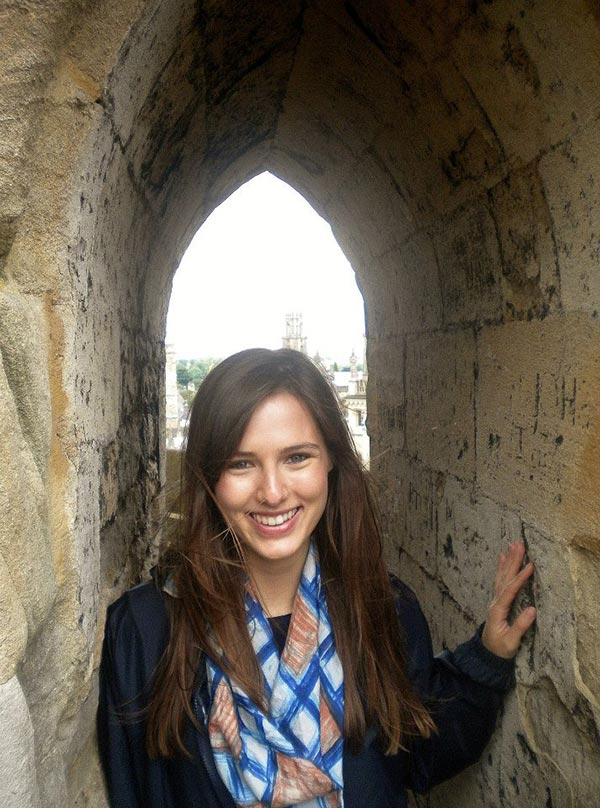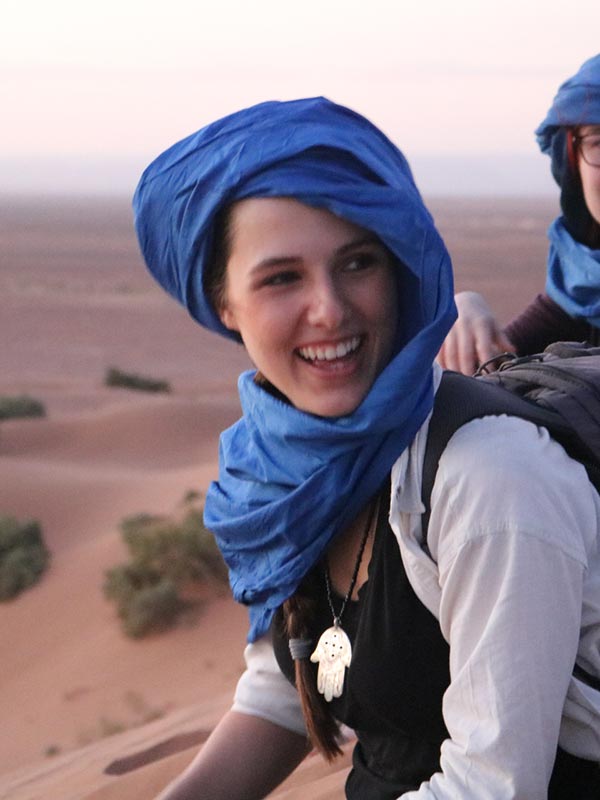Cali Callaway ’17 hopes her research will make a difference for domestic violence survivors.
An inciting incident
When Cali Callaway ’17 was 13 years old, her grandfather slipped and fell down the stairs, resulting in a traumatic brain injury. When his neurosurgeon made light of the situation upon arrival at the hospital, Cali vowed that when she became a doctor she would ensure that her patients had positive experiences.
“We found another neurosurgeon who was caring and compassionate, and even though my grandfather died that week, he made it bearable,” she said. “It highlighted for me the importance of communicating compassionately with patients during high stress situations.”
The experience sparked her interest in the human brain, and throughout high school, she sought opportunities to learn more about it. She took summer courses at Brown University and interned at the Shepherd Center in Atlanta, examining the effectiveness of robotic rehabilitation devices on stroke and spinal cord injury survivors.
When it was time to look at colleges, the Johns Creek native had a difficult time deciding between a number of elite institutions, including UGA, Yale, MIT, Vanderbilt and Georgia Tech. When she was offered a Foundation Fellowship, UGA’s foremost undergraduate scholarship, she knew UGA was the best choice.
In her own words
“The research opportunities that UGA offers are unlike those at any other university. The sense I got at other universities is that undergraduate research either wasn’t a big focus, or it was something that didn’t happen until senior year. I jumped into a lab the first week of freshman year.”
-Cali Callaway
Scholarships made the world her laboratory
Through the Center for Undergraduate Research Opportunities, Cali studied under Steve Stice, Ph.D., Georgia Research Alliance Eminent Scholar and director of the UGA Regenerative Bioscience Center. Together, they researched the use of regenerative medicine for spinal cord injuries.
“What’s great about chickens is that they develop in an egg, so you can crack the egg and insert mouse stem cells without ever having to remove the chicks,” Cali said. “We were trying to see if we could control the muscle movement of the chickens with these stem cells, which has great implications for cell replacement therapy.”
Since enrolling at UGA, Cali has watched the sun rise over the Sahara Desert, interned at Hocoma AG in Switzerland, the world’s largest producer of robotic rehabilitation devices, and spent spring break on cultural immersion experiences in Cuba and Morocco. She is the president of UGA MathCounts and the Honors Program Student Council, and is a member of Palladia, Omicron Delta Kappa, Blue Key and Tate Honor Societies.
Turning trauma into purpose
However, her research on brain injuries in domestic violence victims has proven to be the most transformative experience as an undergraduate.
“I was sitting at home reading an article in The New Yorker called “No Visible Bruises” about toxic brain injuries that occur in strangulation in domestic violence cases,” she said. “People started to realize that the victims were exhibiting signs of brain injuries, but police officers and health professionals were attributing it to fear.”
This inspired her to develop a “Sexual Assault Resources Guide” to educate students on campus about intimate partner violence and list the resources on campus available to victims of sexual assault. UGA’s Center for Teaching and Learning now distributes this directory to professors to include on their course syllabi.
After graduation, the 2016 Goldwater Scholar plans to attend medical school to become a neurologist. She has a number of medical school acceptance letters in hand and has the opportunity to study basic and translational neuroscience at Cambridge University. Ultimately, Cali would like to give back to the city of Atlanta by returning to the Shepherd Center or Grady Hospital to conduct research.
“I have developed this great interest in social justice and intimate partner violence through research and I would really to meld those two things,” Cali said. “When you say you’re interested in women’s issues in medicine, people assume you want to be an OB/GYN, but I know my passion is neuroscience.”






